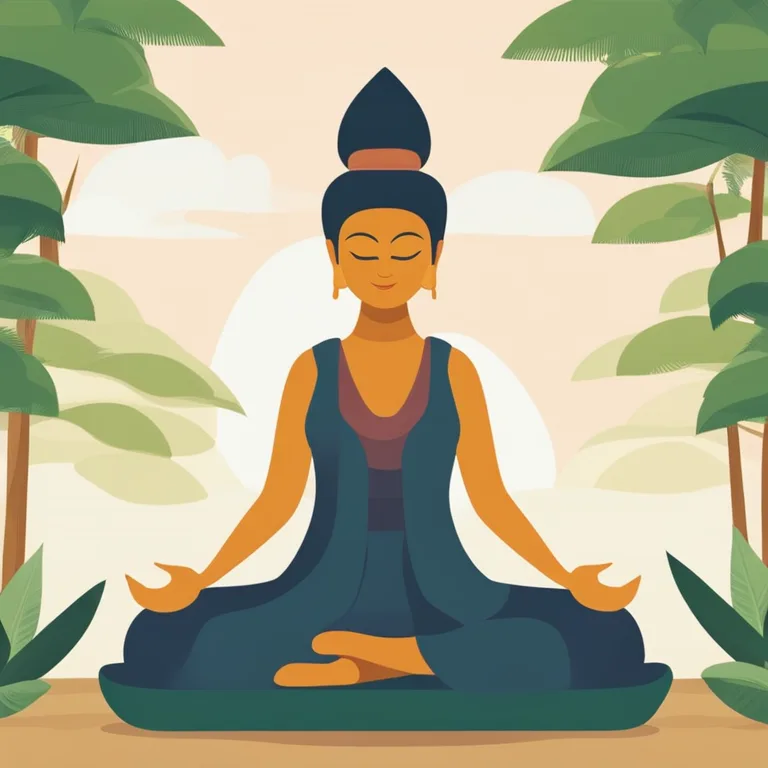
Meditation & Mindfulness Essentials
Delve into the core principles of meditation and mindfulness to cultivate inner peace and enhance your well-being in today’s fast-paced world.
article by Hina Kurosawa
The Basics of Meditation
Meditation is an ancient practice that has transcended cultural boundaries and withstood the test of time. It involves quieting the mind and focusing inward to achieve a state of calm. Rooted in many spiritual and philosophical traditions, this exercise is widely recognized for its mental, physical, and emotional benefits. The adoption of meditation in modern living has seen a surge with its positive effects backed by scientific studies, making it a go-to practice for those seeking tranquility amidst chaos. It's less about altering the mind and more about observing it, which in turn, promotes a heightened sense of awareness and presence.

Understanding Mindfulness
Mindfulness, often used interchangeably with meditation, is actually the quality or state of being conscious or aware of something. It's an aspect of meditation focused on the acceptance and acknowledgment of one’s feelings, thoughts, and bodily sensations in the present moment. A cornerstone of mindfulness is the non-judgmental component, encouraging practitioners to observe their experiences without criticism or attachment. The heightened sense of awareness gained through mindfulness leads to a deeper connection with oneself and the outside world, fostering a balanced perspective on life’s experiences.

Benefits of the Practices
These practices have been the subject of extensive research, revealing an array of benefits. Meditation can decrease stress, improve concentration, and contribute to increased emotional well-being. Mindfulness, specifically, can enhance cognitive flexibility and improve relationship satisfaction by promoting empathy and compassion. Furthermore, regular practice can lead to physiological benefits like reduced blood pressure, pain reduction, and improved sleep patterns. These outcomes make both meditation and mindfulness powerful tools for managing the daily pressures of the 21st century.

Starting Your Practice
To begin, one need not be an expert or spiritual guru. Start with short sessions, as little as five minutes a day, and build up gradually. Find a quiet space where you can sit comfortably without interruptions. Close your eyes and focus on your breath, a mantra, or even the sounds around you. The key is consistency; making meditation and mindfulness a regular part of your routine is what will yield noticeable results over time. Remember, the goal is not to silence your mind but to become aware of your thoughts without being overwhelmed by them.

Challenges Along the Way
It's common to encounter obstacles when cultivating a practice of meditation and mindfulness. Distracting thoughts, restlessness, and lack of time are frequent hurdles. However, these challenges are part of the journey and can be addressed through persistent practice. Guided sessions, meditation apps, and community groups can provide support for those who struggle. It is crucial to approach these challenges with patience, and over time, the mind learns to settle more readily into a state of focused relaxation.
Maintaining a Regular Practice
As with developing any new habit, consistency is key. Many find that incorporating meditation and mindfulness into their daily routine, like during the morning or before bedtime, helps in maintaining discipline. It can also be helpful to keep a journal to note your experiences and progress. Tracking your journey not only serves as encouragement but may also offer insights into the subtler changes in your mental and emotional landscape as you delve deeper into the practice.
The Future of Meditation and Mindfulness
Looking ahead, we can see that meditation and mindfulness will continue to grow in popularity, owing to their adaptability and ubiquitous benefits. With the advent of virtual reality meditation sessions and AI-driven mindfulness apps, technology is poised to play an increasingly significant role in these ancient practices. As society evolves, so too does the approach to these self-reflective techniques, ensuring they remain relevant and accessible to all who seek solace in our fast-paced world.
Published: 1/8/2024
Modified: 1/8/2024
More predictions
Come back here soon to learn more about yourself and your future


Meditation's Impact on the Limbic System
Explore how meditation can positively influence your emotional and neurological well-being through its effects on the limbic system.


A Guide to Leading Mindfulness Meditation
Discover the steps to effectively lead a session of mindfulness meditation, fostering tranquility and awareness in your daily life.


Harmony in Meditation: Fostering Mindfulness and Balance
Discover the art of achieving inner tranquility and equilibrium through mindful meditation practices.